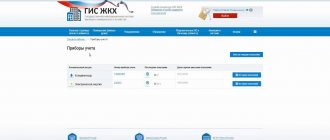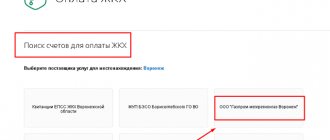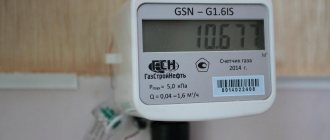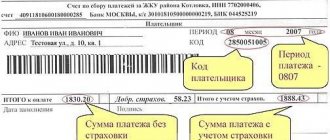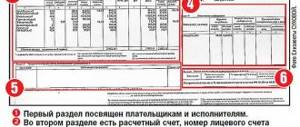A personal account is a unique combination of numbers under which comprehensive information about a specific property is encrypted. A document confirming its assignment is issued upon commissioning of a new building or upon purchase of housing on the secondary market. Every month the owner or tenant of the premises pays for the received utilities. If it is not possible to see the combination of numbers in an official document, there are several more options to find out your personal account by address. Why it is required, and in what ways it can be obtained, this will be discussed further.
Why do you need a personal account?
This set of numbers will tell you detailed information about the following indicators.
Technical
These are all the characteristics of housing. For example, how many rooms are there, and what communications are provided.
Legal
This is information about who the owner is and how many people are registered.
Financial
The presence or absence of debts to pay utility bills.
Payment for services is carried out on an individual basis. This can be done through a cashier of a financial institution, the Internet or a terminal. Also, using the invoice, you can find out the list of services and whether the owner has debts to pay for them.
Infocraft: housing and communal services formula
Important! If the housing is jointly owned, then before dividing the personal account, you need to determine the specific shares of the co-owners. This can be done by agreement of the parties, when all owners agree and themselves determine the shares of each of the co-owners.
This agreement must be notarized. If there is no agreement between the owners of the apartment regarding the shares, then the shares of each owner in the common apartment can be determined in court. Division of a personal account in the Management Company If all homeowners agree to divide the personal account, this procedure is significantly simplified. An application signed by the owners of the property to split the personal account is submitted to the management company or HOA.
A personal account can be opened for any adult citizen living and registered in a residential premises with the consent of all registered in the residential premises or all owners of the residential premises. In the case of opening a personal account for a minor from 14 to 18 years of age, the written consent of his legal representative is required, which is noted in the order to open a personal account. 2.5.
A personal account is opened from the moment of registration of citizens' ownership of real estate, or from the moment of concluding a social tenancy agreement for residential premises, a tenancy agreement for residential premises, a tenancy agreement for specialized residential premises or another civil law agreement.
2. 6. A personal account in a newly built house is opened from the moment the house is put into operation. 2. 7.
Where and how to find out the drug number
The easiest way for holders of an official document is to look at their individual number. If this is not possible, there are other ways to obtain information. Let's figure out how to find out your personal housing and communal services account by address without having a document confirming its assignment.
In receipts for payment of housing and communal services
It’s easy to look up the number you’re interested in on your utility bill. Take any and carefully consider the details. The necessary numbers may be hidden under the name “payer code” or “personal account”.
Important: the set of numbers remains the same regardless of the type of receipt and the month for which it was issued.
Therefore, you can view the details even on the old payment card. If for some reason this option is not suitable, you can find out your personal account by address in other ways.
In the Internet
Use this method if you don’t have a receipt at hand, but have access to the Internet. How can you find out your personal account:
On the State Services website
To do this, enter the query in the search bar: “Unified portal of public services” and select the first option in the search results. Only official websites of the Russian Federation are suitable. If you are registered, then simply log in with your account. If you are applying for the first time, then you have to go through a simple registration. Next, open the “Payment” tab and go to utilities.
Specialized Resources
The most popular of them are Yandex.Money or Sberbank of Russia. With their help, you can determine the drug number, as well as pay for services and fines. To do this, enter the query “Yandex money” into the search bar, then enter the site, select the “Payment for services” section and enter the address.
Important: on the Internet there are a lot of other, often not government, services that accept payments for housing and communal services and provide information about drugs. But, in most cases, they charge a commission for their services.
In the management company
If you were unable to use the previous methods and still haven’t figured out how to find out your personal account by address, contact the management organization. You can do this in the following ways:
Via phone call
To obtain information, you need to provide the last name, first name and patronymic of the owner of the property, and at what address he is registered.
In fact, the management company is not obliged to provide such information over the phone, and legally may not disclose the personal account. But if you apply in person, the owner will not be refused.
When visiting the office in person
When going to the housing and communal services management office, make sure you have the original identification document. Based on it, they will provide a single invoice for payment for services and any information on it.
Hint: you can find out the work schedule and office address of the management company on your utility bill payment receipt or by finding the organization’s official website on the Internet.
In Sberbank
Only current clients of the bank can receive information and carry out transactions. Next, there are three options for obtaining information:
In your personal account
To do this, log into Sberbank Online by entering your username and password. Next, enter the query “Personal accounts for Sberbank” in the search bar on the bank’s website, then enter the address of the property.
At a Sberbank branch
This option does not require registration in a virtual account. You can find out your individual account by contacting a Sberbank employee directly. He will provide information only to the owner or tenant. A necessary condition is the availability of documents confirming your identity. These include a passport or driver's license.
At an ATM
To do this, go to the “Search for Information” menu item. Next, enter your address and receive your individual account number and information about its status.
Sberbank of Russia provides any information not only about the account number, but also its current status. To do this, you do not need to contact a specialist at a bank branch. Just find an ATM or go to your online account.
Personal accounts for payment of housing and communal services
Between homeowners
- In the Management Company
- Judicially
- In a non-privatized apartment
A personal account is provided to a separate residential premises (apartment, room in a communal apartment, individual residential building). Sometimes it becomes necessary to divide the personal account for payment of utilities, so that the owner of a share of the apartment pays only for his part of the housing he occupies. This need often arises among former spouses who no longer maintain a joint household, but continue to live in the same apartment. If the personal account is divided, then each owner of a shared apartment will receive a separate receipt, and this provides the opportunity to pay utility bills only for his part of the housing, and guarantees that this owner will not be responsible for the debts of the co-owner if the latter has arrears in rent .
Additional Information
An individual number will be needed to pay for utilities and to obtain account information. How to find out the debt for housing and communal services provided will be discussed further.
How to check the status of an individual drug
You can find out the balance by individual number:
- By visiting the website of the government services portal.
- Using the services of Sberbank of Russia.
- By making a request to the management company.
You can find out your financial status in the same place where you can find out the combination of numbers itself.
How to find out the debt for housing and communal services by LS number
When paying for utilities online, use the following services:
Government services website
With its help, you can find out the amount of debt for housing and communal services and pay it off. To do this, find the service catalog and select the housing and communal services section. Enter the address manually or make automatic settings. This will provide information about the balance of funds. Based on it, you will pay for the services.
GIS housing and communal services
Log in to your Personal Account on the main page, and if you don’t have it, register. Next, enter your personal number and receive information on its status and existing debt.
Sberbank
Using your Personal Account online or at an ATM, you will find out your balance, receive an invoice and make a payment. A receipt confirming the transaction will be printed as a check or sent to the account holder's email.
At the service provider
If you do not find information about the debt on your paper payment, contact your utility company. This can be done over the phone or in person during business hours.
Is it possible to split a personal account?
This question is relevant if several people use the housing. At the same time, they want to pay for the services themselves. If the apartment is owned by one owner, then a problem will arise with the division of accounts. Such an issue can only be resolved through a court, the decision of which is not always in favor of the applicant. In this situation, it is necessary to divide the ownership of this object, and only then it will be assigned two different accounts.
Things are simpler with real estate that is jointly owned. By law, each owner has the right to an individual account. Payments are calculated on it in accordance with the share in the real estate.
In municipal housing, which is not actually the property of its owner, but is used under a social tenancy agreement, separation of details is impossible.
Blog
The topic of balances on the personal account of the house is as old as the world, although it is most often returned to when the MKD left management. In such a situation, the owners of the premises or the new management organization require the “old” management organization to return the “positive” balance on the personal account of the house. The walkers appeal that the money has been paid, but the work has not been completed. The courts, referring to Article 1102 of the Civil Code of the Russian Federation, recover the amount of balances in favor of the owners. In this article, I will begin to consider the main mistakes of management organizations in reflecting and forming balances on the personal account of MKD.
So, the basics...
When asked where the concept of the balance on an MKD personal account is given, the majority of seminar participants answer that there is no such concept. This is where the first mistake lies. There is such a concept and it is spelled out in GOST R 51929-2014. National standard of the Russian Federation. Housing and communal services and management of apartment buildings. Terms and Definitions.
According to clause 8.18 of the above GOST, the personal account of an apartment building
- this is
“an accounting register designed to generate personalized data about objects and sources of financing, as well as to record transactions related to accruals, borrowings, receipts and expenditures of funds, in accordance with contractual obligations assumed during the operation, management and maintenance of an apartment building Houses"
.
Please note that housing legislation does not contain the concept of “account register”. But the concept of a register is in the legislation, which regulates the procedure for maintaining accounting records on the territory of the Russian Federation. Thus, in clause 3.1 of the Regulations on Documents and Document Flow in Accounting, it is stated that the information contained in the primary documents accepted for accounting, necessary for reflection in accounting, is accumulated and systematized in accounting registers
.
Thus, the personal account of an MKD is a purely accounting document
, which is compiled on the basis of accounting data, and not on the basis of incomprehensible (forgive me for the directness) tables compiled by economists of management organizations according to principles known to them.
Economists here, of course, can be offended and say that they have everything right. But then answer me a few simple questions:
- How is it that the accountant of the management company makes a profit at the end of the year according to the MKD, but the economists in the same house do not have a profit, but some balances that cannot be profit by definition?
- Why did economists previously reflect only positive balances on the MKD personal account in Form 2.8 (even though it seems to be canceled soon), and negative balances did not appear in this form?
The answer to these two questions is trivial: absolutely all management organizations incorrectly reflect in their accounting transactions related to the accrual of the cost of services for the maintenance and repair of the common property of apartment buildings, and incorrectly reflect the revenue from the sale of services for the maintenance and repair of the common property of apartment buildings .
This is where the main problem with reflecting residues lies: few people know how they are formed and how they should be reflected.
The abundance of seminars and webinars from “gurus in housing and communal services” does not solve the problem, since the “gurus” only confuse their wards even more, and the latter make mistakes in preparing reports to the owners of premises in apartment buildings. The main rule of communicating with gurus is to understand that they DO NOT TAKE ANY RESPONSIBILITY FOR THEIR WORDS.
The cruel truth, mother...
Question 1. Can there be a zero balance on the MKD personal account at the end of the calendar year?
The answer is that this cannot happen in principle.
The exception is a hypothetical situation where the following conditions are simultaneously met:
- The owners approved the list of works and services, which began to work on January 1.
- During the calendar year, the management organization completed work for exactly the cost that was approved in the list of works and services. A penny for a penny.
Transfer the above conditions to any apartment building that is under your control. Are these conditions fulfilled simultaneously? I think not, and if not, let’s move on...
If you look at the norms of clause 7 of Article 156 of the Housing Code of the Russian Federation, you will see that “the amount of payment for the maintenance of residential premises in an apartment building is determined taking into account the proposals of the management organization and is set for a period of at least one year”
. A similar rule is contained in clause 31 of the Rules for the maintenance of common property in an apartment building, approved by Decree of the Government of the Russian Federation of August 13, 2006 No. 491.
Proposals from the management organization are drawn up in the form of a list of works and services, which must contain all the work and services that will be performed by the management organization within one year from the date of approval of the list of works at the general meeting of owners. The summed cost of all “annual” works and services indicated in the list of works is divided by 12 months and by the area of premises in the apartment building owned by the owners, which ultimately forms the concept of “amount of payment for residential premises”
.
Let's take as an example a situation where the management organization took control of an apartment building from 09/01/2017 and from that moment on it has been performing the work (services) specified in the list of works and services approved at the general meeting.
From September 2021 to December 2021 inclusive, snow removal work will be carried out (if it falls, of course). At the same time, the cost of cleaning the local area from snow was included in the list in one line and every month it is billed to the owners of the premises in the form of 1/12 of the annual planned cost of the service
.
Consequently, property owners must pay for snow removal in the spring, summer and autumn (until September 2021), and the snow will not actually be removed during this period due to its absence
. That is, there is payment for snow, but the work is not being done.
The above example with snow is indicative in that from September 2017 to December 2021 inclusive, the management organization will incur much more costs than it will receive from the owners in the form of accruals in receipts, which at the end of 2021 (remember that the report is made as of December 31 .2017) will form the debt of the owners to the management organization, which will be repaid in 2021.
But we saw zero balances on the personal account of the house, reflected in form 2.8 on the website reformazhkh.ru; many will exclaim and they will be right. There was such a thing, but:
- If you look at the structure of Form 2.8 “Report on the execution of a management contract by a management organization”, approved by order of the Ministry of Construction of the Russian Federation dated December 22, 2014 No. 882/pr, you will see that on lines 5 and 19 management organizations could reflect either zero values or positive balances . This is logical, since these lines reflected the carryover cash balances at the beginning and end of the year, and either there is cash or there is not.
- In turn, if the management organization performed more work (services) in the reporting year than was accrued to the owners of the premises according to receipts, then this (subject to signing the act of completed work with the house council)
forms receivables from the owners to the management organization, which will be repaid in the following reporting periods.
Therefore, even if the management organization’s annual report shows zero balances on the MKD’s personal account, this does not mean that no one owes anything.
To be continued…
You can discuss the article and ask questions here.
Grounds for opening a personal account to pay for utilities
A personal account is provided to a separate residential premises (apartment, room in a communal apartment, individual residential building). Sometimes it becomes necessary to divide the personal account for payment of utilities, so that the owner of a share of the apartment pays only for his part of the housing he occupies. This need often arises among former spouses who no longer maintain a joint household, but continue to live in the same apartment. If the personal account is divided, then each owner of a shared apartment will receive a separate receipt, and this provides the opportunity to pay utility bills only for his part of the housing, and guarantees that this owner will not be responsible for the debts of the co-owner if the latter has arrears in rent . Information about persons jointly registered with the owner (tenant) (or having the right of ownership or use of this residential premises along with him) (last name, first name, patronymic, year of birth, date of registration in this residential premises, presence of family ties with the owner (tenant) ; 1. 3. 3. Main characteristics of the residential premises (its area (total, living), isolation of premises and their number, auxiliary premises (kitchen, toilet, bathroom, hall, etc.); 1. 3. 4.
Information about the availability of benefits to the owner (tenant), or to persons who, along with him, have the right of ownership (use) of this residential premises, the grounds for providing these benefits; 1. 3. 5. Other information. 2. Opening a financial personal account 2. 1. As a rule, the total amount of accruals for the month is divided among all residents in equal shares. Example: A personal account for paying utilities in a three-room apartment was divided between 3 owners.
One person is assigned to each room. The total amount for the use of communal resources was 10 thousand rubles per month, respectively, this amount will be divided between three owners. As a result, each of them will receive an individual payment document, which will indicate an amount equal to 3,333 rubles. Important! If the housing is jointly owned, then before dividing the personal account, you need to determine the specific shares of the co-owners.
This can be done by agreement of the parties, when all owners agree and themselves determine the shares of each of the co-owners. This agreement must be notarized. If there is no agreement between the owners of the apartment regarding the shares, then the shares of each owner in the common apartment can be determined in court. Division of a personal account in the Management Company If all homeowners agree to divide the personal account, this procedure is significantly simplified. An application signed by the owners of the property to split the personal account is submitted to the management company or HOA.
